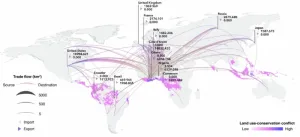(Press-News.org) Researchers at Baylor College of Medicine have discovered a crucial regulator of the anti-cancer immune response that could change the game in the fight against cancer. Published in the Proceedings of the National Academy of Sciences, the study shows that in animal models of breast and prostate cancer, eliminating the gene SRC-3, specifically in a type of immune cell called regulatory T cells (Tregs), triggered a lifelong anti-cancer response that eradicated the tumor without the typical side effects observed with other therapies.
Furthermore, transferring Tregs without SRC-3 to animals carrying breast cancer tumors also resulted in long-term elimination of the tumor without negative side effects. The findings encourage pursuing further investigations to determine the value of this approach to treat the human disease.
“More than 30 years ago, my lab discovered a protein we called steroid receptor coactivator (SRC) that is required for the effective regulation of gene activity,” said corresponding author Dr. Bert W. O’Malley, chancellor and professor of molecular and cellular biology at Baylor. “Since then, we have discovered that a family of SRCs (SRC-1, SRC-2 and SR-3), regulates the activity of a variety of cellular functions.”
Over the years, the O’Malley lab and colleagues have been particularly interested in SRC-3 and its role in cancer. SRC-3 is not only highly expressed in all human cancers and plays a role in cancer growth, but it is also strongly expressed in Tregs that regulate the immune response to cancer. Intrigued by the abundance of SRC-3 in Tregs and suspecting that it might play a role in controlling cancer progression, O’Malley and his colleagues investigated the effect of eliminating the gene SRC-3 in Tregs on breast cancer growth.
The team generated mice lacking the SRC-3 gene only in Tregs (SRC-3 knock-out) and then compared breast cancer progression in these mice with the progression in mice that had the SRC-3 gene.
“We were surprised by the results,” O’Malley said. “Breast tumors were eradicated in the SRC-3 knock-outs. A subsequent injection of additional cancer cells in these mice did not give rise to new tumors, showing that there was no need to generate additional SRC-3 knock-outs to sustain tumor resistance. Importantly, transferring these cells to animals carrying pre-established breast tumors also resulted in cancer eradication. We obtained similar results with prostate cancer.”
The team also discovered that Tregs lacking SRC-3 mediated long-lasting tumor eradication by effectively modifying the environment surrounding the tumor into one that favored its elimination.
Using a variety of laboratory techniques, O’Malley and his colleagues discovered that the modified Tregs proliferated extensively and preferentially infiltrated breast tumors where they released compounds that generated an anti-tumor immune response. On one side, the compounds facilitated the entrance of immune cells – T cells and natural killer cells – that directly attacked the tumor and, on the other side, modified Tregs blocked other immune cells that attempted to stop the anti-tumor response.
“Other published treatments seem to reduce tumor burden or eliminate the cancer for some time, but in most cases it returns. Our findings in animal models are the first to show that Tregs lacking SRC-3 eradicate established cancer tumors and appear to confer long-lasting protection against recurrence,” said first author Dr. Sang Jun Han, associate professor of molecular and cellular biology and in the Center for Reproductive Medicine at Baylor. He also is a member of Baylor’s Dan L Duncan Comprehensive Cancer Center. “We are very excited about the results; altogether they warrant continuing our investigations to translate the findings into a novel, more effective and longer-lasting cancer therapy.”
Other contributors to this work include senior scientists David M. Lonard and Cliff C. Dacso and lab members Prashi Jain, Yosef Gilad, Yan Xia, Nuri Sung, Mi Jin Park, Adam M. Dean, Rainer B. Lanz, Jianming Xu, all at Baylor.
This work is partly supported by funding from the National Institutes of Health grants R01HD07857, R01HD08188 and R01HD098059 and CoRegen, Inc.
Baylor has partnered with CoRegen, Inc. to commercialize these groundbreaking discoveries. All the patents and intellectual property underlying these discoveries have been licensed to CoRegen, Inc. (www.coregeninc.com)
END
Eliminating gene SRC-3 in immune cells triggers effective long-lasting anti-cancer response
2023-05-29
ELSE PRESS RELEASES FROM THIS DATE:
Even lawyers don’t like legalese
2023-05-29
CAMBRIDGE, MA -- It’s no secret that legal documents are notoriously difficult to understand, causing headaches for anyone who has had to apply for a mortgage or review any other kind of contract. A new MIT study reveals that the lawyers who produce these documents don’t like them very much either.
The researchers found that while lawyers can interpret and recall information from legal documents better than nonlawyers, it’s still easier for them to understand the same documents when translated into “plain English.” Lawyers also rated plain ...
One-third of galaxy’s most common planets could be in habitable zone
2023-05-29
Our familiar, warm, yellow sun is a relative rarity in the Milky Way. By far the most common stars are considerably smaller and cooler, sporting just half the mass of our sun at most. Billions of planets orbit these common dwarf stars in our galaxy.
To capture enough warmth to be habitable, these planets would need to huddle very close to their small stars, which leaves them susceptible to extreme tidal forces.
In a new analysis based on the latest telescope data, University of Florida astronomers have discovered ...
Mapping the conflict between farming and biodiversity
2023-05-29
It’s well known that producing foods such as beef can have an outsized footprint when it comes to carbon emissions. But a new study shows that some of these same staples can have an equally huge effect when it comes to biodiversity losses.
One of the main problems, the study found, results when food production overlaps with areas that have been identified as having the highest conservation priority.
Food production remains the main cause of biodiversity loss.
“Food production remains the main cause of biodiversity loss,” said Keiichiro Kanemoto, an associate professor at the Research Institute for Humanity ...
COVID-19 vaccine builds powerful immune response in First Nations peoples, study finds
2023-05-29
Published in Nature Immunology and Nature Briefing, the research is the first of its kind to decisively map immune responses produced by a COVID-19 vaccination in any First Nations populations.
In partnership with Menzies School of Health Research, researchers at the Peter Doherty Institute for Infection and Immunity (Doherty Institute) evaluated immune responses in Aboriginal and Torres Strait Islander peoples and non-Indigenous individuals after receiving the mRNA COVID-19 vaccine.
Lead author of the study and PhD candidate at the Doherty ...
X-ray emissions from black hole jets vary unexpectedly, challenging leading model of particle acceleration
2023-05-29
Researchers discovered only relatively recently that black hole jets emit x-rays, and how the jets accelerate particles to this high-energy state is still a mystery. Surprising new findings in Nature Astronomy appear to rule out one leading theory, opening the door to reimagining how particle acceleration works in the jets—and possibly also elsewhere in the universe.
One leading model of how jets generate x-rays expects the jets’ x-ray emissions to remain stable over long time scales (millions of years). However, the new paper found that the x-ray emissions of a statistically significant number of jets varied over just a few years.
“One ...
New blood biomarker can predict if cognitively healthy elderly will develop Alzheimer’s disease
2023-05-29
PITTSBURGH, May 29, 2023 – Why do some people develop Alzheimer’s disease while others don’t? And, even more puzzlingly, why do many individuals whose brains are chock-full of toxic amyloid aggregates—a telltale sign of Alzheimer’s brain pathology—never go on to develop Alzheimer’s-associated dementias?
University of Pittsburgh School of Medicine researchers appear to have found the answer. Star-shaped brain cells called astrocytes are key to swaying the pendulum in Alzheimer’s disease progression, shows new game-changing research published today in Nature Medicine.
By testing the blood of more ...
A novel blood serum assay to diagnose neurodegenerative diseases
2023-05-29
Synucleinopathies are a group of neurodegenerative diseases caused by the abnormal accumulation α-synuclein, a protein normally found in the brain and neurons. Incorrect folding of α-synuclein leads to formation of ‘seeds’, which attract more α-synuclein proteins to form larger clumps. Although, α-synuclein seeds have been found in various tissues and blood of patients with synucleinopathies, its potential as a biomarker is ambiguous.
Recently, in a study published in Nature Medicine, Associate Professor Ayami Okuzumi along with Senior Associate Professor Taku Hatano, both ...
Study reveals underlying genetic risks for a type of heart attack largely affecting younger women
2023-05-29
Research led by the National Institute for Health and Care Research (NIHR) Leicester Biomedical Research Centre (BRC) and Universite Paris Cite, and supported by worldwide partners in Canada, the USA and Australia, has identified new genes that are associated with an increased risk of a type of heart attack primarily affecting young to middle-aged women. The results are published in Nature Genetics today, 29 May 2023.
SCAD – or Spontaneous Coronary Artery Dissection – is when a bruise or bleed occurs in the wall of a coronary artery, cutting off the blood to part of the heart. This leads to a heart attack. Unlike other types of heart attack, SCAD ...
Pan-cancer T cell atlas reveals new details of tumor microenvironment
2023-05-29
HOUSTON ― A new study led by researchers at The University of Texas MD Anderson Cancer Center, published today in Nature Medicine, provides a deeper understanding of the vast diversity of T cell states as well as their relationships and roles within the complex tumor microenvironment, bringing a fresh perspective to understanding immunotherapy efficacy in cancer.
This new pan-cancer single-cell T cell atlas integrates 27 single-cell RNA sequencing datasets, including nine unique datasets from MD Anderson, covering 16 cancer types. It is the most detailed picture to date of the heterogeneity ...
KRISS ushers in era of green hydrogen
2023-05-29
Hydrogen has been gaining attention as a clean and efficient energy source. However, is hydrogen really environmentally friendly? Most hydrogen commonly used now is “grey hydrogen” derived from fossil fuels. Since its production process accompanies generation of green house gas, it can be said that grey hydrogen is not environmentally friendly in the strict sense. The era of “green hydrogen” without carbon emissions has not yet begun.
The Korea Research Institute of Standards and Science (KRISS, President Hyun-min Park) has demonstrated the key to the longevous and efficient photoanode with protective film, which is used to produce hydrogen ...




